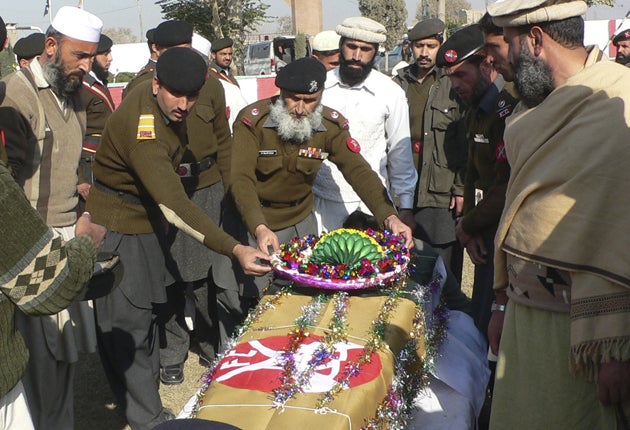Zardari defiant as he rallies grassroots
Weeks ago his future looked in doubt, but now the President is fighting back

Your support helps us to tell the story
From reproductive rights to climate change to Big Tech, The Independent is on the ground when the story is developing. Whether it's investigating the financials of Elon Musk's pro-Trump PAC or producing our latest documentary, 'The A Word', which shines a light on the American women fighting for reproductive rights, we know how important it is to parse out the facts from the messaging.
At such a critical moment in US history, we need reporters on the ground. Your donation allows us to keep sending journalists to speak to both sides of the story.
The Independent is trusted by Americans across the entire political spectrum. And unlike many other quality news outlets, we choose not to lock Americans out of our reporting and analysis with paywalls. We believe quality journalism should be available to everyone, paid for by those who can afford it.
Your support makes all the difference.Fighting back against a formidable array of opponents, Pakistan's President Asif Ali Zardari has thrown himself into a whirlwind tour of the country, rousing the party faithful with defiant speeches, delivered in regional languages matching his regional attire.
The mismatch between his opulent clothes and surroundings and the gritty populism of his message verges on the comical. "I can hear the voices of the poor!" Mr Zardari thundered at Lahore's colonial-era Governor's House on Thursday, regaled in an elaborate white and gold Punjabi turban. The adoring crowd registered their approval with yelps of joy.
"Our emotions soared again for the first time since Benazir Bhutto was killed," enthused party volunteer Farhad Jalal, 24. "When he started in Punjabi, it altered the mood completely." With his high-voltage smile back in place, Mr Zardari appeared far more relaxed than he has done while speaking in halting English and finely cut suits. Earlier this month, his head encased in a busily patterned Sindhi skullcap, Mr Zardari rallied the grassroots support in his native southern province. In the same week, he travelled to the south-western province of Baluchistan to express his solidarity with its conflict-scarred and impoverished people.
Only a few weeks ago, Pakistan was seized with doubts over Mr Zardari's future: the Supreme Court struck down an amnesty exempting him and close associates from standing trial on long-standing corruption charges; opponents piled on the pressure calling for his resignation, and it seemed highly possible that the head of state of a key Washington ally might be forced from office.
Now, having temporarily abandoned the comforts of his fortified presidential palace, Mr Zardari is looking to send out a clear message. "He's out to revitalise his party," said prominent commentator Nusrat Javeed. "The chips are down. He feels as if he's being pushed against the wall, and that the best defence is to go on the offensive."
But while Mr Zardari appears to be regaining his footing, his unpopular government still faces daunting challenges. Terrorist attacks have killed more than 600 members of the public since October. The state of the economy, dogged by low growth and high inflation, has aroused public anger. Power cuts last for hours, even in winter.
Aides to Mr Zardari point out that his government has achieved successes on some fronts. "We are fighting the war on terror and have convinced the people of Pakistan that this is indeed our war," said presidential spokesman Farahnaz Ispahani. "The national budget has for the first time been fairly divided between the provinces. And the Benazir Income Support Programme has brought hope and food into the poorest homes." Another aide said: "Gordon Brown's poll ratings aren't any better. That doesn't stop his ability to govern and remain in office."
But powerful forces are ranged against him. The military establishment, which has ruled this country for over half its history, looks unkindly on his attempts to chart an independent foreign policy. Since coming to power, Mr Zardari's attempts to bring the Inter-Services Intelligence (ISI) agency under civilian oversight, to develop closer ties with India, and resist the reinstatement of Chief Justice Iftikhar Chaudhry, have all been all discretely thwarted by Pakistan's generals.
But the army, locked in fierce military offensives against the Taliban, is not in a position to intervene directly, said Dawn columnist Cyril Almeida. Mr Zardari does, however, still appear to scent threats from restive political opponents in the media and the Supreme Court. "My impression is that he is convinced that his opponents are pushing him towards early elections," said Mr Javeed.
*A US missile strike in the North Waziristan killed one of the FBI's most-wanted terrorists, Jamal Saeed Abdul Rahim, who has a $5m (£3.1m) bounty on his head, Pakistani intelligence officials said. His death would be seen as the latest victory in the recently escalated missile campaign against militant targets within Pakistan.
Subscribe to Independent Premium to bookmark this article
Want to bookmark your favourite articles and stories to read or reference later? Start your Independent Premium subscription today.
Join our commenting forum
Join thought-provoking conversations, follow other Independent readers and see their replies
Comments